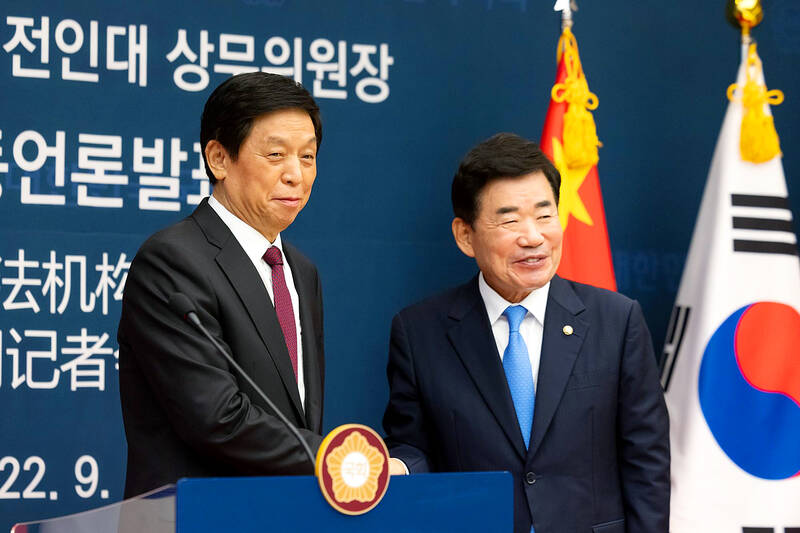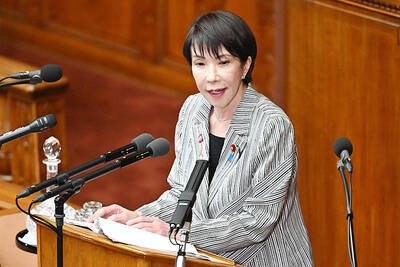China’s top legislator yesterday met South Korean President Yoon Suk-yeol in Seoul, as the two pledged not to let South Korea’s military alliance with Washington become an obstacle to Seoul’s ties with Beijing.
Li Zhanshu (栗戰書), third in the Chinese Communist Party hierarchy and one of Chinese President Xi Jinping’s (習近平) closest confidants, is the highest-level Chinese official to visit South Korea since his predecessor came here in 2015.
Li’s trip is seen as part of Beijing’s efforts to boost ties with neighboring countries ahead of the Chinese Communist Party congress next month that is likely to grant Xi a third five-year term as leader.

Photo: Bloomberg
Li’s visit is also crucial for Yoon’s government as it wants to assure Beijing that its push to reinforce the US alliance and participation in US-led regional initiatives would not target China, its biggest trading partner.
As chairman of the standing committee of the Chinese National People’s Congress, Li is heading a 66-member Chinese delegation to South Korea that includes three Cabinet-level officials.
Li met with Yoon after separate talks with Korean National Assembly Speaker Kim Jin-pyo and other South Korean parliamentary leaders on cooperation between the two countries’ legislatures.
Li’s closeness to Xi suggests his comments reflect the thinking of Xi and his inner circle.
Li said that he does not want a US-made missile shield deployed by Seoul to become “an obstacle to relations” after Beijing slammed its use.
Li agreed with Yoon to continue to “closely communicate” regarding the system known as THAAD, or Terminal High Altitude Area Defense, a statement from the South Korean presidential office said.
Yoon has been trying to balance relations between South Korea’s long-standing US ally and China, his country’s biggest trading partner. The president sent ripples through relations with Washington when he decided against having a face-to-face meeting with US House of Representatives Speaker Nancy Pelosi during her trip to Seoul last month. The snub of the first sitting House speaker to visit the country in about 20 years drew criticism from members of South Korea’s opposition and Yoon’s own conservative party.
Yoon has pledged make the THAAD system fully operational and install another unit in the Seoul area. China objects to the shield over concerns its powerful radar would allow spying on its own missile systems.
Yoon’s office earlier said that he plans to meet US President Joe Biden next week when he travels to New York for a session of the UN General Assembly.
South Korea has shown its displeasure over the Inflation Reduction Act signed last month by Biden, which includes tax credits of as much as US$7,500 for purchases of electric vehicles made in North America. That could disadvantage major South Korean brands such as Hyundai and Kia, which do not have operational EV plants in the US.
Additional reporting by Bloomberg

The Central Weather Administration (CWA) yesterday said it expected to issue a sea warning for Typhoon Fung-Wong tomorrow, which it said would possibly make landfall near central Taiwan. As of 2am yesterday, Fung-Wong was about 1,760km southeast of Oluanpi (鵝鑾鼻), Taiwan’s southernmost point, moving west-northwest at 26kph. It is forecast to reach Luzon in the northern Philippines by tomorrow, the CWA said. After entering the South China Sea, Typhoon Fung-Wong is likely to turn northward toward Taiwan, CWA forecaster Chang Chun-yao (張峻堯) said, adding that it would likely make landfall near central Taiwan. The CWA expects to issue a land

Taiwan’s exports soared to an all-time high of US$61.8 billion last month, surging 49.7 percent from a year earlier, as the global frenzy for artificial intelligence (AI) applications and new consumer electronics powered shipments of high-tech goods, the Ministry of Finance said yesterday. It was the first time exports had exceeded the US$60 billion mark, fueled by the global boom in AI development that has significantly boosted Taiwanese companies across the international supply chain, Department of Statistics Director-General Beatrice Tsai (蔡美娜) told a media briefing. “There is a consensus among major AI players that the upcycle is still in its early stage,”

The Central Weather Administration (CWA) yesterday said it is expected to issue a sea warning for Typhoon Fung-wong this afternoon and a land warning tomorrow. As of 1pm, the storm was about 1,070km southeast of Oluanpi (鵝鑾鼻), Taiwan’s southernmost point, and was moving west-northwest at 28 to 32kph, according to CWA data. The storm had a radius of 250km, with maximum sustained winds of 173kph and gusts reaching 209kph, the CWA added. The storm is forecast to pass near Luzon in the Philippines before entering the South China Sea and potentially turning northward toward Taiwan, the CWA said. CWA forecaster Chang Chun-yao (張峻堯) said

Japanese Prime Minister Sanae Takaichi yesterday said that China using armed force against Taiwan could constitute a "survival-threatening situation" for Japan, allowing the country to mobilize the Japanese armed forces under its security laws. Takaichi made the remarks during a parliamentary session while responding to a question about whether a "Taiwan contingency" involving a Chinese naval blockade would qualify as a "survival-threatening situation" for Japan, according to a report by Japan’s Asahi Shimbun. "If warships are used and other armed actions are involved, I believe this could constitute a survival-threatening situation," Takaichi was quoted as saying in the report. Under Japan’s security legislation,